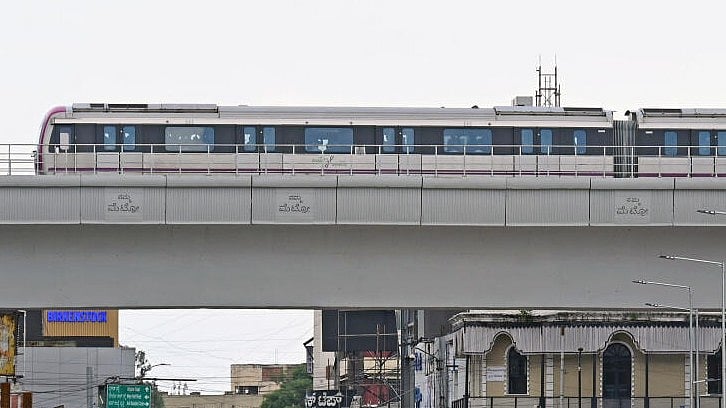
File photo of a Purple line metro. (Representative image)
Credit: DH Photo/Pushkar V
As many as 11,137 trees will be felled or translocated for Namma Metro's Phase 3, which will have two corridors spanning a total of 44.65 km, according to the newly released Detailed Project Report (DPR).
Phase 3, also called the Orange Line, will be fully elevated and bring the metro to the western side of the Outer Ring Road (ORR) and the remote areas along Magadi Road. Slated for completion in 2029, it is estimated to carry 7.85 lakh passengers per day and will expand Bengaluru's metro network to 222.2 km.
While Phase 3 has received all statutory clearances, including the union cabinet in August this year, its construction has been delayed due to revised plans to build double-decker (metro-cum-road) flyovers along the alignment.
The double-decker, estimated to cost Rs 120 crore per kilometre, or Rs 5,358 crore for 44.65 km, will be funded by the Bruhat Bengaluru Mahanagara Palike (BBMP) or the state government. The proposal has been okayed in principle but awaits state cabinet clearance.
The environmental impact of the project will be significant. The loss of tree cover, along with dust generated during excavation, material transport and construction activities, as well as emissions from diesel generators, will likely cause environmental hazards for areas in southern, western and northwestern Bengaluru.
To mitigate these effects, Bangalore Metro Rail Corporation Limited (BMRCL) has proposed to undertake compensatory afforestation under a Rs 43.53-crore environmental monitoring plan.
BMRCL Managing Director M Maheshwar Rao said plans were afoot to plant Miyawaki trees, known for higher density, wherever possible.
However, DT Devare, a trustee of the Bangalore Environment Test (BET), emphasised that compensatory afforestation was not the solution. "We should strive to save every tree wherever possible, in accordance with court orders," he said.
He urged the BMRCL to conduct a thorough Environmental Impact Assessment (EIA) and hold public consultations during the process.
The BMRCL has begun geotechnical investigations to examine the physical properties of soil and rocks to determine the depth and design of foundations necessary for metro pillars in Phase 3.
However, the double-decker plan has delayed tenders for the start of civil work (viaducts and stations).
According to Rao, the BMRCL is finalising various civil components, including the need for additional land at some locations, to build the double-decker. "Our design structures will change to facilitate additional loads. We are awaiting formal government approval for the double-decker," he told DH.
MS Channappagoudar, General Manager (Land Acquisition), BMRCL, noted that about 25% more land would be required for station buildings because of increased height requirements, viaduct and road-widening due to the double-decker. A fresh land plan is under preparation, he added.
The DPR estimates the total land requirement at 5,98,528 square metres.
Following the double-decker plan, the BMRCL has dropped the previous proposal to build flyovers at Sarakki and Kamakhya junctions under Phase 3. Instead, the double-decker will have entry/exit ramps at Sarakki, Mysuru Road, Sumanahalli and Goraguntepalya junctions. The Delmia junction flyover will be demolished, too, he added.
Of the total estimated cost of Rs 15,611 crore, Rs 7,577 crore will be secured through an external funding agency, most likely the Japan International Cooperation Agency (JICA), which has informally agreed to provide the full loan. The funding agreement is expected to be finalised in the next six months, according to a senior BMRCL official.